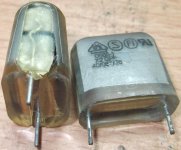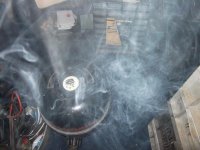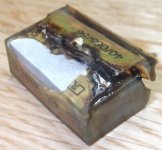Hi Guys,
Was wondering if anyone is playing around with the above.
Looking into which brands sounds best.
Thanks
Was wondering if anyone is playing around with the above.
Looking into which brands sounds best.
Thanks
I would only use X or Y capacitors in an AC supply input stage.
So of course, capacitor sound is irrelevant.
So of course, capacitor sound is irrelevant.
Hi Guys,
Was wondering if anyone is playing around with the above.
Looking into which brands sounds best.
Thanks
Sûndblöedhm Platinum Series are handcrafted by the Dalai Lama himself on February the 29th nights only, have 720 degree increased soundstage, better black noise granularity, Boltzmann Quantic reproduction on strings and deep creamy espresso foam smoothness on male voice.
Now if you are into shrill peaky sharp sweetness, nothing better than Puccini Pavarotti Scala di Milano series by Ottonelli Superecliptic.
Dielectric is built out of monoatomic interlayers , one Poly Ester in phase, one Poly Carbonate out of phase, so dreaded Poly cancels out and you end up with a pure 50/50 mixture of Esther and Carbonate.
Well looks like I've answers fromthe wrong people.
Go play with some JM & then post your findings.
Goes for you too Scott
Yes Refugee mine blew up but it was power on all
the time on my amps ac socket
Go play with some JM & then post your findings.
Goes for you too Scott
Yes Refugee mine blew up but it was power on all
the time on my amps ac socket
Seeing as class X and Y capacitors are for use in safety critical applications, parts that fail like that have something seriously wrongThey are not good for valve or tube audio.
Once they have aged with or without power applied they fail in a spectacular way.
The post from Refugee1 is about RIFA PME271 Paper-foil capacitors. Although I haven't had failures with them, I tend to believe the experiences from fellow forum members here.
As far as I can remember, it had to do with cracks in the body. The later potentially results in humidity from the air being absorbed by the paper, because of its hygroscopic nature.
As far as I can remember, it had to do with cracks in the body. The later potentially results in humidity from the air being absorbed by the paper, because of its hygroscopic nature.
Hi 50AE
Perhaps the new Wima MKP X series would be better.
After my blew up I tried rebuilding the filter using Wima
FKP but unfortunately it doesn't sound as good. Hence
my Q
Thks
Perhaps the new Wima MKP X series would be better.
After my blew up I tried rebuilding the filter using Wima
FKP but unfortunately it doesn't sound as good. Hence
my Q
Thks
I think the polycarbonate Philips capacitor MKC 341 might satisfy your needs. It's 250VAC rated and class X. I have lots of them and I can offer you a pair to try, but only of 1uF value.
Another one I liked in the past is the RIFA PHE840.
Another one I liked in the past is the RIFA PHE840.
Sorry, I misunderstood, I thought you meant their effect on the audio, not the sound they made as they blew up, I'll get out of your hair
They are not good for valve or tube audio.
Once they have aged with or without power applied they fail in a spectacular way.
Makes we wonder where they are buying the fakes?Seeing as class X and Y capacitors are for use in safety critical applications, parts that fail like that have something seriously wrong
Yes Scott you heard it correct it had effect on sound.
That's also the reason why I posted in swap meet
looking for that illusive Rubycon noise filter.
It does something so nice that none of these
caps that I've tried could manage & worse still
even the FKP shrunk the sound stage, darken
the sound even. It's the same as tweaking caps
in PS & local decoupling. You'll hear it no BS
about it
Cheers
That's also the reason why I posted in swap meet
looking for that illusive Rubycon noise filter.
It does something so nice that none of these
caps that I've tried could manage & worse still
even the FKP shrunk the sound stage, darken
the sound even. It's the same as tweaking caps
in PS & local decoupling. You'll hear it no BS
about it
Cheers
Capacitors in audio , particularly in the signal chain have to be tried out for you to know if they are worth it or not. There is no other way of determining that. Some X or Y caps sound OK and some don't sound right. Some have plated iron lead and some have copper leads....does that matter ? They aren't all made exactly the same way. So you need to try them out if you have them.
Some polyester caps also sound very good . Polypropylene are at the top but even there not ALL of them sound the same ! You need to try them out in your set up. Your ears will tell you more than the spec sheet !😉
If they all sound the same to you, you are a lucky guy ! You can get away with the least expensive versions ! This is a great situation to be in. Then you can forget everything else and just focus on enjoying the music !🙂
Some polyester caps also sound very good . Polypropylene are at the top but even there not ALL of them sound the same ! You need to try them out in your set up. Your ears will tell you more than the spec sheet !😉
If they all sound the same to you, you are a lucky guy ! You can get away with the least expensive versions ! This is a great situation to be in. Then you can forget everything else and just focus on enjoying the music !🙂
Last edited:
I admit I do prefer to focus on the music and my experience of being over analytical of the sound has been to the detriment of that, that's just me. Also, I don't doubt that people hear a difference for all sorts of reasons, but a difference is just that and how are you going to know how someone else's hearing differs from yours and the words they use to describe them?
Back to topic: Yes, these old Rifas are famous for blowing up. In the past I had to replace several of them. Sad to say the blew up when I was not present, so I cannot contribute on their sound😉
Sorry, missed reading the warning: only acceptable answers can come from True Believers 🙄Well looks like I've answers fromthe wrong people.
Still fail to understand why and how a .047 film capacitor can sound different to another .047 film capacitor , when used as, say, a coupling capacitor between two audio stages, part of a tone control or bypassing supply rails ... or any other standard use inside an Audio amplifier.
Do you have any explanation as to why/how could they sound different or add any measurable/audible change?
Your very question is baffling, bordering on nonsense.
A coupling cap can have no influence on sound stage, which is set and defined when recording .the FKP shrunk the sound stage, darken
the sound even.
Only influence possible is where it can grossly affect signal on *one* channel and not the other so you kill or damage the stereo channel separation or phase and so affect perceived musical instrument position.
But if you use same brand and type on both, even if they are terrible (which I find impossible or they wouldn´t be approved for a very dangerous electrical safety duty) worst case both channels would be affected same way, general quality *might* suffer, yet soundstage would be unaffected.
I´m using the regular definition of soundstage of course, not some vague idea concocted in feeble brains.
It's the same as tweaking caps
in PS & local decoupling. You'll hear it no BS
about it
And what sound influence do you expect *there* ?
Beyond heavy expectation bias, of course.
You might try painting the Audio Room walls another colour and comment on soundstage changes or sound darkening.
Hey, *that* will have more influence now thta I think about it, a new paint coat might change wall surface reflection or damping ... in any case a physically more important effect than switching capacitor *brand*.
- Status
- Not open for further replies.
- Home
- Design & Build
- Parts
- X & Y capacitors


